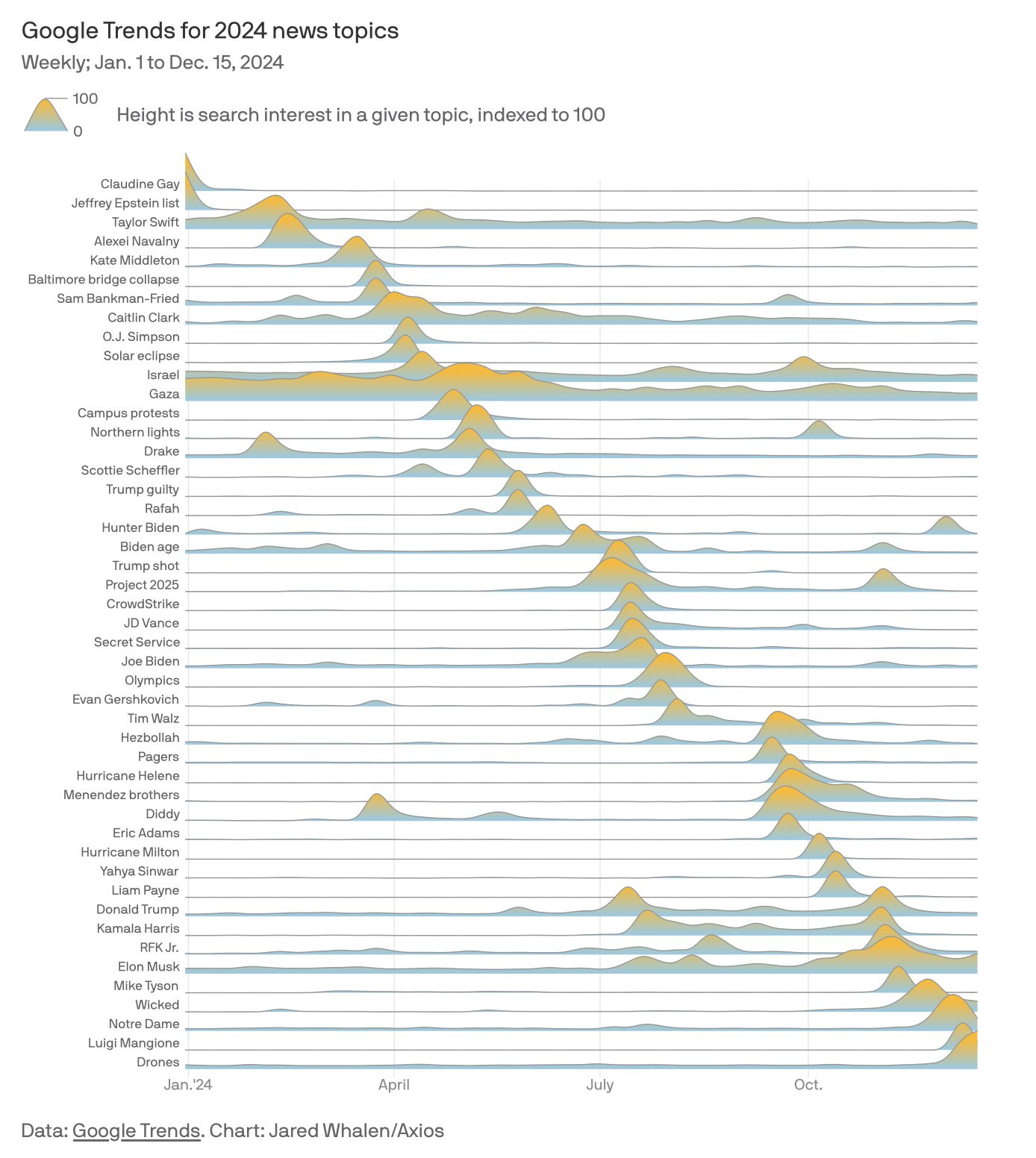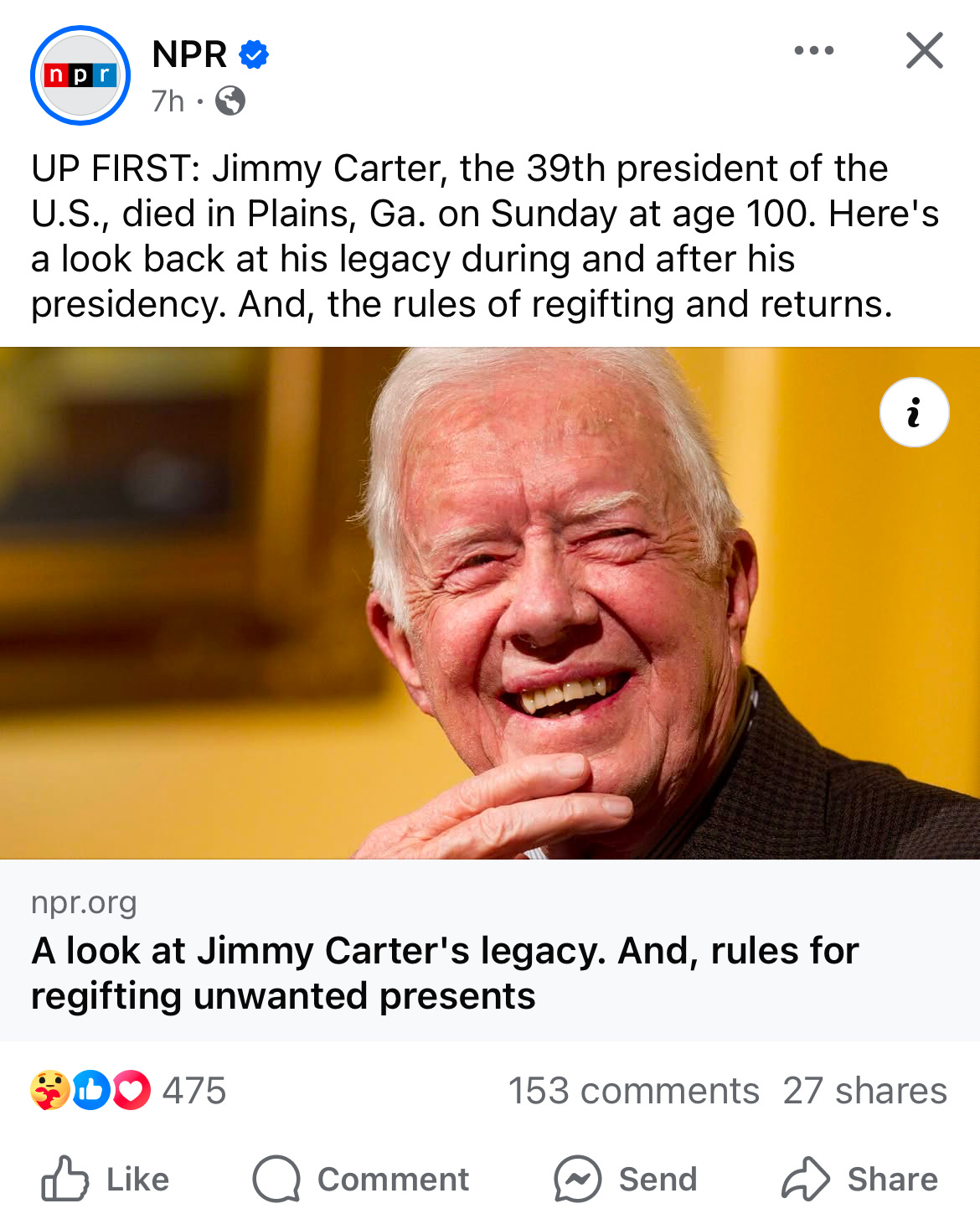Chaotic News Cycles | Stunted Generational Growth | Carter's Legacy
Plus: Comments Section Is Open and Available for Subscribers
Welcome to the new Second Drafts—same as the old Second Drafts, but twice the frequency and half the length (both of which tend to make for a good haircut).
Herein lies news and culture from the perspective of a Midwesterner who grew up and lives in the Land of Lincoln, across the Mighty Mississip from Twain, and downstate (but still within effect) of the evangelistic passion of Billy Sunday.
To be sure, it’s an acquired taste.
Sources and articles for this edition of Second Drafts include:
Axios: 2024’s chaotic news cycles in one chart
Wall Street Journal: What happens when a whole generation doesn’t grow up?
NPR: A look at Jimmy Carter’s legacy. And, rules for regifting unwanted presents [note: this headline is not a typo]
Comments are open after each article if you’d like to engage and share your own thoughts. The more, the merrier, but be warned: they’re public, so be reasonable.
As always, thanks for reading Second Drafts,
Craig
PS: After you finish reading, vote for the article in this edition that you most appreciated. Your feedback will play some degree into future article selection.
PPS: In case you missed the memo earlier this week, I’m planning to publish every two weeks instead of just once a month. Next publication date: January 17.
Axios: 2024's chaotic news cycles in one chart
Jumping back in with both feet as a news and culture hobbyist, I couldn’t have asked for a better chart of chaff to chew on than this.
The news site Axios posted this year-end article (with visual) documenting Google search trends of topics in 2024’s news cycles. Their two observations:
“America’s short attention span for news led to dramatic ups and downs in search trends as the media pivoted from one major story to the next.”
and
“Only a small handful of people and news events managed to hold public attention over long-term periods.”
Yes, I know it’s Google, and no, I don’t trust Google any farther than you could throw me when it comes to their bias and manipulation of data. But if you were a celebrity (Taylor Swift, Caitlin Clark, Drake, Elon Musk), at war (Israel and Hamas), or presidential candidate (Biden, Trump), you played consistently in the theater of people’s search engines in 2024. Play stupid games, win stupid prizes.
Studying the chart, I recalled a quote from former First Lady Eleanor Roosevelt:
“Great minds discuss ideas;
average minds discuss events;
small minds discuss people.”
Ideas, folks. We’ve got our work cut out for us.
Wall Street Journal: What happens when a whole generation doesn’t grow up?

The Wall Street Journal published an essay by Rachel Wolfe (here’s a free version if you’re not a subscriber to WSJ) about a topic I’ve been writing about for 15 years: generations not maturing.1 She writes:
“Americans in their 30s have never looked less like grown-ups.
Amid steep declines in homeownership, marriage and birth rates, economists have long been warning that young people are struggling to meet the milestones of adulthood. Although some 30-somethings are consciously choosing a less traditional path, many say these goals are simply out of reach.
‘It feels like the instructions for how to live a good life don’t apply anymore’, says 38-year-old Cody Harding, who is single and lives with three roommates in Brooklyn. ‘And nobody has updated them.’”
Maybe the instructions don’t need updating; maybe they just need following.
Regardless of the usual narrative, Wolfe says don’t assume the challenges are only economic ones:
“The conventional explanation for what’s freezing young adults in place is that they can’t afford to grow up, given rising inflation and ballooning housing costs. Yet this doesn’t quite explain what’s going on…In many ways, this age group is in a better place financially, on average, than their parents were at this age. The problem is that they don’t seem to know it.”
So what then is the problem beneath the problem?
“At least part of what’s stunting the growth of a generation of young people are outsized dreams of what a good life looks like. ‘Our expectations are so much higher today,’ says Melissa Kearney, an economist at the University of Maryland whose research focuses on children and family. ‘Generations before us didn’t expect to have large houses where every kid had a bedroom and there were multiple vacations.’”
Says Harding:
“It’s fine trying to reinvent what a modern life looks like, but I’m a little disappointed by everything that it lacks. I’m sick of partying. I did that already. I want to grow up.”
Whereas reinventing modern life seems less and less the answer, embracing more of a pre-modern life might be, at least according to secular social psychologist Jonathan Haidt. In his After Babel newsletter on Thursday, Haidt wrote:
“In my first book, The Happiness Hypothesis, I found that ancient wisdom about human relationships, consciousness, and flourishing holds up well in light of modern psychology. But as the digital age drowns us in exponentially increasing rates of new content—most of which is trivial and ephemeral—it is becoming clear that almost everything more than a few years old gets buried by incoming content. This is a serious problem for the continuity of any civilization if most writing and ideas propagate laterally (from peer-to-peer) and very little propagates longitudinally, from generation-to-generation. Our godlike technology may be cutting us off from the accumulated and hard-won wisdom of humanity.”
Want to help someone of a younger generation take the first step in maturing? Help him wrestle with his fascination and preoccupation with the new and the novel. As Solomon wrote thousands of years ago in Ecclesiastes 1:9-10:
“What has been is what will be,
and what has been done is what will be done,
and there is nothing new under the sun.
Is there a thing of which it is said, ‘See, this is new’?
It has been already in the ages before us.”
Until we embrace the wisdom of the past, we’ll take little with us into the future.
NPR: A look at Jimmy Carter’s legacy. And, rules for regifting unwanted presents.
I’m not sure who the headline writer is for NPR’s social media, but who knew he or she could write with this kind of sophisticated ironic humor?
To be fair, the link and headline mash-up were for NPR’s Up First newsletter, “the stories you need to start your day, hand-picked for you every weekday,” and while it’s always a challenge to combine content in a digital newsletter (trust me on this…ahem), I couldn’t help thinking how apropos the headline was to describe the former president’s one-term, very mixed bag of an administration.
Carter was the first president I remember seeing on TV. I also saw him up close and personal when he came through Pike County campaigning in 1976 (I would have been five). I was sad that he lost (badly) to Ronald Reagan in November of 1980, but that was only because I was nine and a fan of his Georgia drawl.
While I share several sentiments from Michael Horton in this tribute to Carter’s faith, as well as appreciate the fact that he was our last pro-life Democrat president, there are several unwanted “presents” from his presidency I wish we could return. Three that come to mind off the top: his abrupt and knee-jerk energy policies, his lack of competent foreign negotiation skills, and basically the entire United States Department of Education.
That said, I’m glad for his marriage fidelity (77 years!) and Christian testimony. May he rest in peace, and may Democrats and Republicans alike consider the best of who he was and what he did politically and make application.
“We are learning to do a great many clever things…the next great task will be to learn not to do them.”—G.K. Chesterton, “Queen Victoria” in Varied Types
“Who Are the Real Adolescents?” (Second Drafts: September 5, 2007); “38 Today” (Ibid.: February 5, 2009); “Recitation & the Progress of Humanity” (Ibid.: November 26, 2018).







Wish I could choose/vote for them all, as they all resonate with my own views and experiences. Unless you have supernatural abilities to digest enormous amounts of information banging on your head all at once, it's a losing battle. I have a finite number of news sources (1440, Free Press, Ground News) and that is it. Re: not growing up, Steve and I are also still 35 in our heads, but our goals and where we're at life-stage wise are those shared by 75 yr olds. Maybe it's the way we grew up: single-parent households, learning quickly the difference between a Need and a Want. However, our kids (classic Millennials) are physically mid-late 30s, but their lifestyles are sold out to the pursuit of pleasure (movies, events, trips, more stuff), with no vision towards having options later in life, or the stark reality that the gravy train will slow to a trickle someday. I also liked your thoughts on Carter, and share similar views: a good man, tragic missteps in his presidency as well as after (he was speaking out of school (badly!) trying to be an informal negotiator with known ME terrorist groups). I well remember interest rates in the 20s and gas rationing. I applaud his work with Habitat, his faith, and his longstanding fidelity to his wife. Thanks as always for your thoughtful curation of good things to read :)
I enjoyed all your articles, only wished they were a bit longer! It seems to me a connection between then is ideas — what we have to learn to consider in order to really consider anything to shows up in the news; what will root us to the part so that we can grow with purpose into the future—what ideas were previous generations considering, and to what effect?; and the department of education under Carter! Education as exposure to and thoughtful consideration of ideas has been stripped to measurable knowledge and skills, to the detriment of us all.